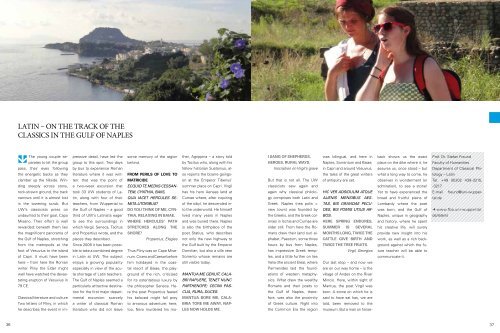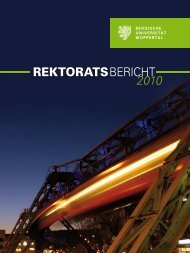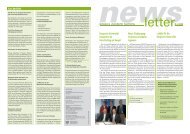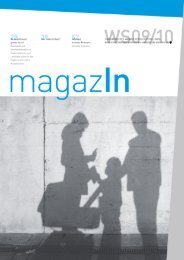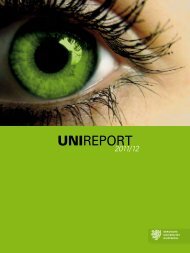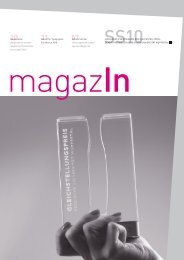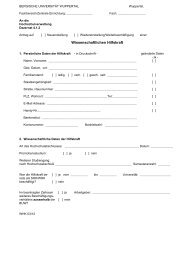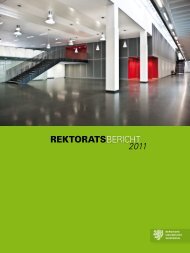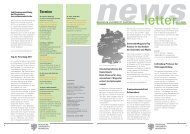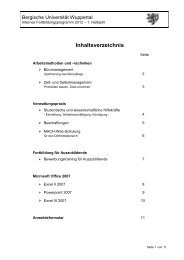international - Bergische Universität Wuppertal
international - Bergische Universität Wuppertal
international - Bergische Universität Wuppertal
Create successful ePaper yourself
Turn your PDF publications into a flip-book with our unique Google optimized e-Paper software.
36<br />
latin – on the traCk of the<br />
ClassiCs in the gUlf of naples<br />
The young couple se-<br />
parates to let the group<br />
pass, their eyes following<br />
the energetic backs as they<br />
clamber up the hillside. Winding<br />
steeply across stony,<br />
rock-strewn ground, the track<br />
narrows until it is almost lost<br />
in the towering scrub. But<br />
UW’s classicists press on<br />
undaunted to their goal, Capo<br />
Miseno. Their effort is well<br />
rewarded: beneath them lies<br />
the magnificent panorama of<br />
the Gulf of Naples, stretching<br />
from the metropolis at the<br />
foot of Vesuvius to the island<br />
of Capri. It must have been<br />
here – from here the Roman<br />
writer Pliny the Elder might<br />
well have watched the devastating<br />
eruption of Vesuvius in<br />
79 CE.<br />
Classical literature and culture<br />
Two letters of Pliny, in which<br />
he describes the event in im-<br />
pressive detail, have led the<br />
group to this spot. Two days<br />
by bus to experience Roman<br />
literature where it was written:<br />
that was the point of<br />
a two-week excursion that<br />
took 33 UW students of Latin,<br />
along with four of their<br />
teachers, from <strong>Wuppertal</strong> to<br />
the Gulf of Naples – a good<br />
third of UW’s Latinists eager<br />
to see the surroundings in<br />
which Vergil, Seneca, Tacitus<br />
and Propertius wrote, and the<br />
places they described.<br />
Since 2008 it has been possible<br />
to take a combined degree<br />
in Latin at UW. The subject<br />
enjoys a growing popularity<br />
especially in view of the acute<br />
shortage of Latin teachers.<br />
The Gulf of Naples seemed a<br />
particularly attractive destination<br />
for the first major departmental<br />
excursion: scarcely<br />
a writer of classical Roman<br />
literature who did not leave<br />
some memory of the region<br />
behind.<br />
FroM PeriLs oF LoVe to<br />
MAtriCide<br />
Ecquid tE mEdiis cEssan-<br />
tEm, cynthia, Baiis,<br />
qua iacEt hErculEs sE-<br />
mita litoriBus?<br />
do you tHinK oF Me, Cyn-<br />
tHiA, reLAxinG in bAiAe,<br />
WHere HerCuLes’ PAtH<br />
stretCHes ALonG tHe<br />
sHore?<br />
Propertius, Elegies<br />
Thus Pliny was on Cape Mise-<br />
num. Cicero and Caesar before<br />
him holidayed in the coastal<br />
resort of Baiae, the playground<br />
of the rich, criticized<br />
for its ostentatious luxury by<br />
the philosopher Seneca. Here<br />
the poet Propertius feared<br />
his beloved might fall prey<br />
to amorous adventure; here,<br />
too, Nero murdered his mo-<br />
ther, Agrippina – a story told<br />
by Tacitus who, along with his<br />
fellow historian Suetonius, also<br />
reports the bizarre goingson<br />
at the Emperor Tiberius’<br />
summer place on Capri. Virgil<br />
has his hero Aeneas land at<br />
Cumae where, after inquiring<br />
of the sibyl, he descended into<br />
the underworld. He himself<br />
lived many years in Naples<br />
and was buried there. Naples<br />
is also the birthplace of the<br />
poet Statius, who describes<br />
not only the new highway to<br />
the Gulf built by the Emperor<br />
Domitian, but also a villa near<br />
Sorrento whose remains are<br />
still visible today.<br />
mantua mE gEnuit, cala-<br />
Bri rapuErE, tEnEt nunc<br />
parthEnopE; cEcini pas-<br />
cua, rura, ducEs.<br />
MAntuA bore Me, CALA-<br />
briA tore Me AWAy, nAP-<br />
Les noW HoLds Me.<br />
i sAnG oF sHePHerds,<br />
Heroes, rurAL WAys.<br />
Inscription on Virgil’s grave<br />
But that is not all. The UW<br />
classicists saw again and<br />
again why classical philology<br />
comprises both Latin and<br />
Greek. Naples (nea polis =<br />
new town) was founded by<br />
the Greeks, and the Greek colonies<br />
in Ischia and Cumae are<br />
older still. From here the Romans<br />
drew their (and our) alphabet.<br />
Paestum, some three<br />
hours by bus from Naples,<br />
has impressive Greek temples,<br />
and a little further on lies<br />
Velia (the ancient Elea), where<br />
Parmenides laid the foundations<br />
of western metaphysics.<br />
What drew the wealthy<br />
Romans and their poets to<br />
the Gulf of Naples, therefore,<br />
was also the proximity<br />
of Greek culture. Right into<br />
the Common Era the region<br />
was bilingual, and here in<br />
Naples, Sorrentum and Baiae,<br />
in Capri and around Vesuvius,<br />
the tales of the great writers<br />
of antiquity are set.<br />
hic vEr adsiduum atquE<br />
aliEnis mEnsiBus aEs-<br />
tas, Bis gravidaE pEcu-<br />
dEs, Bis pomis utilis ar-<br />
Bos.<br />
Here sPrinG endures,<br />
suMMer is seVerAL<br />
MontHs LonG, tWiCe tHe<br />
CAttLe GiVe birtH And<br />
tWiCe tHe tree Fruits.<br />
Virgil, Georgics<br />
our last stop – and now we<br />
are on our way home – is the<br />
village of Andes on the River<br />
Mincio. Here, within sight of<br />
Mantua, the poet Virgil was<br />
born. A stone on which he is<br />
said to have sat has, we are<br />
told, been removed to the<br />
museum. But a man on horse-<br />
back shows us the exact<br />
place on the dike where it, he<br />
assures us, once stood – but<br />
what a long way to come, he<br />
observes in wonderment (or<br />
admiration), to see a stone!<br />
Yet to have experienced the<br />
broad and fruitful plains of<br />
Lombardy where the poet<br />
was born, and the Gulf of<br />
Naples, unique in geography<br />
and history, where he spent<br />
his creative life, will surely<br />
provide new insight into his<br />
work, as well as a rich background<br />
against which the future<br />
teacher will be able to<br />
communicate it.<br />
Prof. Dr. Stefan Freund<br />
Faculty of Humanities<br />
Department of Classical Philology<br />
– Latin<br />
Tel. +49 (0)202 439-3215,<br />
-3217<br />
E-mail freund@uni-wuppertal.de<br />
k www.fba.uni-wuppertal.<br />
de/latein/<br />
37


